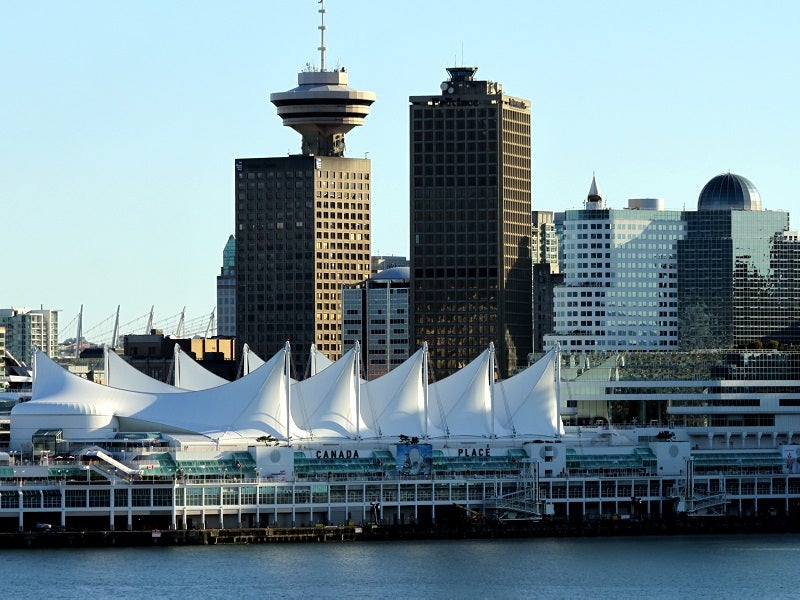
As 2020 kicks off, the Port of Vancouver seems to be off to an encouraging start after closing in on one of its most prolific years ever recorded.
Throughout its 33rd season of cruise operations, which reached an end on 1 November 2019, the area welcomed over a million cruise passengers on-board little less than 290 ships, and is now expecting the high turnout to continue in 2020.
With a new wave of tourists ready to arrive from April this year, the Canadian hub, which is run by the Vancouver Fraser Port Authority, oversees a narrow water corridor running between two strips of mainland.
At the heart of the port is Canada Place, the cruise terminal where journeys to Alaska originate, passing all the way through the idyllic Inside Passage and featuring picturesque views of the British Columbia coastline.
Soaring interest in these natural and urban amenities was largely reflected in the 2019 Cruise Critic’s Cruisers’ Choice Destination Awards, where the city was publicly voted the second-highest-rated cruise destination in the US and Canada.
As the new season approaches, the Port of Vancouver is now preparing for a significant rise in cruise-driven tourism numbers, which, if properly targeted, could continue to generate over $3m in local revenues for each ship that reaches the hub.
How well do you really know your competitors?
Access the most comprehensive Company Profiles on the market, powered by GlobalData. Save hours of research. Gain competitive edge.

Thank you!
Your download email will arrive shortly
Not ready to buy yet? Download a free sample
We are confident about the unique quality of our Company Profiles. However, we want you to make the most beneficial decision for your business, so we offer a free sample that you can download by submitting the below form
By GlobalDataA year in review
The over a million visitors who touched ground at Canada Place in 2019 represented a 22% increase compared to the previous season, registering the second-highest turnout in the port’s history since 2002.
“Vancouver is a global destination due to its natural beauty and continues to attract a wide range of cruise lines and passengers from around the world that visit the Canada Place cruise terminal at Port of Vancouver during their Alaska-bound cruise,” explains Vancouver Fraser Port Authority manager of trade development Carmen Ortega.
Indeed, over the past season, several newcomers booked a slot in Vancouver for their northbound trips, including Cunard Cruise Line with the Queen Elizabeth, Viking Ocean Cruises with the Viking Orion, and Azamara Cruises with the Azamara Quest.
Among these, Cunard’s return to the port for the first time in over 20 years was indicative of the city’s increasing popularity, positively ending a decade that had initially been hit by a passenger slump in 2010.
In addition, in September 2019, Canada Place welcomed the Hurtigruten’s MS Roald Amundsen, one of the only two hybrid ships in the world to be electrically powered, which embarked on its inaugural North American voyage from Vancouver.
Capitalising on new opportunities
Strong on last year’s figures, the Port of Vancouver recently completed a number of improvements that will help it better address future passenger demands.
“Enhancements completed at the Canada Place cruise terminal were designed to improve efficiency as well as passenger and vehicle flows,” says Ortega.
“These improvements include a re-design of the ground transportation area to improve passenger flow, a reconfiguration of the terminal to expand passenger processing areas, and a number of upgrades to all three ship berths.”
Alongside works at Canada Place, Ortega says more and stricter collaboration with local authorities and tourism entities will be key in addressing growing capacity demands. Over the previous year, she adds, these partnerships were key in anticipating and planning for different ship sizes entering the port.
In 2018, this was the case for the Norwegian Bliss, the largest cruise ship to ever dock in Vancouver’s history, whose arrival required planning from the Pacific Pilotage Authority, Norwegian Cruise Line and the port itself.
The nearby Lions Gate Bridge has a low clearance height, which means the Bliss can only reach Vancouver in periods of low tide. For this reason, Ortega explains, the three developed a First Narrows Traffic Control Zone that established guidelines for clearances ahead of the Bliss’ arrival.
The First Narrows waterway, she continues, was also key to “formalise restrictions for ships, such as establishing a clear narrows, which means that no other ship traffic can be present in the first narrows at the time of the transit”.
Environmental and competition challenges
With more, potentially bigger ships expected to carry thousands of new visitors in 2020, the Port of Vancouver is also having to prepare for renewed environmental challenges, which Ortega claims are already being addressed.
Since 2009, when Canada Place started offering shore power to cruise ships, the port authority claims to have enabled over 500 shore power connections, saving some 6,574 tonnes of fuel and cutting 20,000 tonnes of greenhouse gas emissions. Ten years later, the past season has seen almost half of cruise ship visits being shore-power enabled.
As she explains, the Vancouver Fraser Port Authority also has a port-wide emissions inventory, a data set it uses to tracks emissions and work out strategies to cut them. “We also have our EcoAction programme,” Ortega continues, “which has helped to raise awareness within the shipping community around the importance of reducing air emissions.”
Other than sustainability, the port is also facing rising competition from the nearby ports of Seattle and Victoria, which have been expanding over time and are expected “to be in demand over the next few years”. Nevertheless, Ortega maintains that the port’s offers – particularly its one-way itinerary to Alaska – will help it keep ahead of the competition during the new season.



